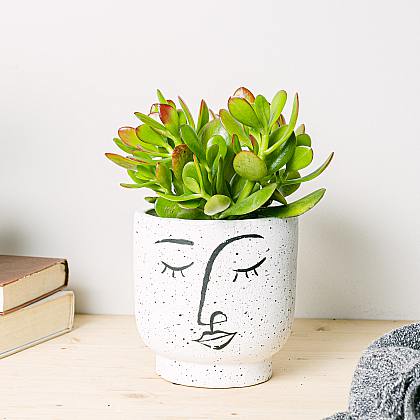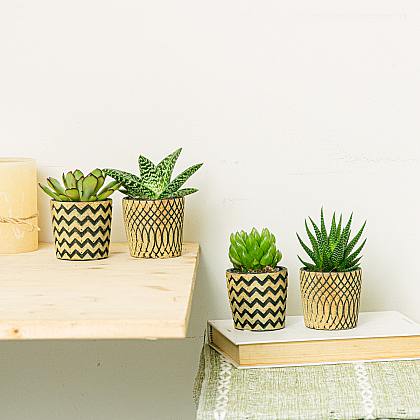A restful sleep: houseplants for your rooms following feng shui
Feng Shui is an ancient practice that seeks to harmonize the environment in which we live to achieve a better quality of life
Feng Shui is an ancient practice that seeks to harmonize the environment in which we live to achieve a better quality of life. One of the most important spaces in our home is the bedroom, as it is there where we spend much of our time and rest to recover energy. In this sense, indoor plants are a key element in achieving a balanced and relaxing environment that promotes restful sleep. In this article, we'll explore the power of Feng Shui in our bedrooms and how we can incorporate houseplants to improve our health and well-being. Find out which are the best plants according to Feng Shui and how you can integrate them into your lifestyle.
The Power of Feng Shui in Your Rooms
The Power of Feng Shui in Your Rooms
Feng Shui is an ancient Chinese practice that seeks to harmonize spaces to promote well-being and positive energy. Applying the principles of Feng Shui in our bedrooms can have a significant impact on our quality of life and, specifically, our restful sleep. According to this philosophy, every element in our room, including the arrangement of furniture and the choice of colors, can affect our energy and mood. This is why it is important to pay attention to the distribution of furniture, avoiding blocking the entry of natural light or creating cluttered spaces that can obstruct the flow of energy. In addition, it is advisable to avoid excessive use of electronic objects in the bedroom, as they can interfere with our rest. Instead, it is suggested to opt for natural materials such as wood and use soft, soothing colors that promote calm and tranquility. Incorporating natural elements such as houseplants is also essential in Feng Shui, as they help purify the air and add a sense of vitality to the space. By applying these principles in our bedrooms, we can create an environment conducive to restful sleep and wake up with greater energy and balance each day.
The Importance of Houseplants
The Importance of Houseplants
Houseplants play a critical role in creating a harmonious and healthy environment in our homes. In addition to their aesthetic beauty, these plants have numerous benefits for our health and well-being. First, they act as natural air purifiers, removing toxins and releasing fresh oxygen. This is especially important in enclosed spaces, where air quality can be poor due to a lack of ventilation. By having houseplants, we can significantly improve the quality of the air we breathe, which in turn can lead to better sleep and a greater sense of well-being.
Another important benefit of houseplants is their ability to reduce stress and promote relaxation. Scientific studies have shown that being close to nature, even in the form of potted plants, can have a calming effect on our mood and help us feel calmer and more collected. This is especially relevant when it comes to the bedroom, as a relaxing environment is crucial for getting a restful night's sleep.
In addition, houseplants can help increase our productivity and concentration. Some varieties, such as the peace lily or the money plant, are believed to have energizing and stimulating properties that can help us stay alert and focused. These plants can also enhance the flow of positive energy in our spaces, according to the principles of Feng Shui.
In short, houseplants not only beautify our homes but also provide us with numerous benefits for our health and well-being. From purifying the air to promoting relaxation and boosting our positive energy, these plants are a valuable investment in creating a harmonious environment conducive to restful sleep.
Houseplants for the Master Bedroom
Choosing the right houseplants for the master bedroom can have a huge impact on our emotional and physical well-being. According to Feng Shui, the main room is a sacred place where we should rest and recharge our energies. The houseplants that are recommended for this room are those that have rounded, soft leaves, as they convey a sense of calm and relaxation. These include the Snake Plant or mother-in-law's tongue, which helps purify the air and reduces humidity levels; the money tree, which symbolizes prosperity and good luck; and the bamboo plant, which represents endurance and strength. Other popular choices include lavender, known for its relaxing and calming properties; peppermint, which can help improve sleep quality; and the peace lily, a plant that purifies the air and brings a sense of tranquility. It's important to note that plants shouldn't take up too much space in the room, as they can disrupt the flow of energy. It is also advisable to choose pots in soft and natural colors to create a harmonious and relaxing atmosphere. In short, incorporating suitable houseplants into our main room can be a simple but effective way to improve our physical and emotional well-being.
Creating a Relaxing Environment with Plants in the Bedroom
Creating a relaxing environment with plants in the bedroom is a great way to promote restful and harmonious sleep. Plants have the ability to purify the air, increase oxygen levels, and reduce stress, making them ideal allies for creating a calm and serene space in the bedroom. When choosing plants for this room, it's important to consider factors such as the amount of natural light available and personal preference. Some popular choices include lavender, known for its relaxing properties and pleasant scent, and peace lily, which helps improve air quality by absorbing common toxins. Other plants that are recommended include English ivy, which helps reduce mold and moisture levels, and lucky bamboo, which is believed to attract good fortune and positive energy. In addition to choosing the right plants, it is important to place them strategically in the bedroom according to the principles of Feng Shui. It is recommended to place them in places where they can receive enough indirect sunlight and avoid placing them near the bed to avoid sleep disruptions. With these simple recommendations, it is possible to transform the bedroom into a quiet and cozy retreat, conducive to restful sleep and an overall sense of well-being.
Plants That Purify the Air and Improve Sleep Quality
There are some houseplants that are not only decorative, but also help purify the air and improve sleep quality. These include Sansevieria, known as mother-in-law's tongue, which is capable of absorbing toxic gases such as benzene and formaldehyde. Another beneficial plant is the Peace Lily, which in addition to purifying the air, also increases the humidity in the room, which is especially useful in dry climates or during the winter when heating is used. Ficus benjamina is another popular plant for improving air quality and reducing carbon dioxide levels. In addition, this plant is easy to care for and can grow into a small tree. Aloe Vera is another popular choice due to its healing and air-purifying properties. This plant is especially useful for people with allergies or respiratory problems, as it helps remove airborne particles that can cause irritation in the airways. Overall, these plants not only improve the air quality in your home, but they can also help you sleep better by reducing the amount of toxins in the environment.
Houseplants That Increase Positive Energy
Houseplants have the ability to increase positive energy in our homes and workspaces. According to Feng Shui, certain plants are especially effective in creating a harmonious and balanced environment. Among these plants are lucky bamboo, known to attract good fortune and prosperity, and peace lily, which helps purify the air and promote feelings of calm and serenity. Another recommended plant is jasmine, whose soft, relaxing scent promotes restful sleep and reduces stress. The jade cactus is also a highly prized plant in Feng Shui as it is believed to attract prosperity and good luck. In addition to these specific plants, any green and healthy plant can help elevate the positive energy in a space. The presence of plants in our environment connects us with nature and helps us create a more welcoming and lively environment. In addition, plants release oxygen and purify the air by absorbing toxins and releasing moisture. Not only does this improve air quality, but it also contributes to more restful sleep and a greater sense of overall well-being. Incorporating houseplants into our décor following Feng Shui principles is a great way to increase positive energy in our spaces and promote restful sleep.
Tips for Incorporating Houseplants into Feng Shui Style
Tips for Incorporating Houseplants into Feng Shui Style:
1. Place plants in strategic places: According to Feng Shui, it is important to place plants in specific areas of the room to maximize their positive energy. For example, you can place tall, leafy plants in the corners of the room to balance the chi and create a sense of harmony.
2. Avoid thorny or spiky plants: According to Feng Shui, plants with sharp leaves or thorns can generate negative energy. It is advisable to avoid these types of plants in the bedroom, as they can interfere with the quality of sleep.
3. Keep your plants healthy and clean: It's important to care for and keep your houseplants in good shape. This involves watering them regularly, removing dry leaves and dust, and making sure they get the right amount of sunlight. healthy plants help improve air quality and bring a sense of vibrancy to the space.
4. Use suitable pots and containers: Choose pots that fit the decorative style of your room and allow good water drainage. In addition, you can opt for ceramic or clay containers, materials that are considered beneficial according to Feng Shui.
5. Combine different types of plants: To achieve an energy balance in your room, it is advisable to combine different types of indoor plants. Some plants can help purify the air, while others can promote relaxation and well-being. Experiment with different species and see how they influence your environment.
By following these tips, you can incorporate Feng Shui style houseplants into your bedroom and enjoy their benefits for a restful sleep and a harmonious environment.
In short, Feng Shui and indoor plants can be great allies to improve the quality of our sleep and increase positive energy in our rooms. Choosing the right plants and their strategic location can have a significant impact on our emotional and physical well-being. In addition, incorporating these practices into our home can be a simple and inexpensive way to create a more relaxing and balanced environment. However, it is important to remember that Feng Shui is not an exact science and that each person has their own needs and preferences. Therefore, it is essential to experiment with different plants and techniques until you find what works best for each individual. Would you like to try these suggestions at home and share your results?


